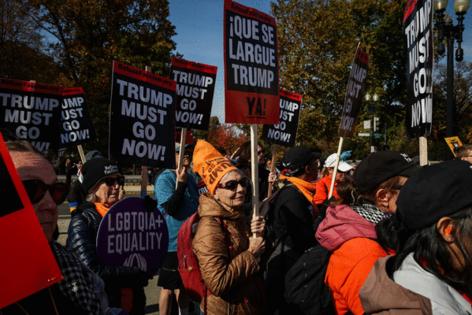Editorial: The Supreme Court rightly leaves same-sex marriage alone
Published in Op Eds
President Donald Trump’s reelection stirred concern among many that constitutional protections, including the right to marry, could be put back on the table.
The Supreme Court put those fears to rest Monday when they decided to leave it well enough alone.
At issue was a petition from a former county clerk from Kentucky who had asked the court to revisit its landmark ruling on same-sex marriage.
Former Rowan County Clerk Kim Davis in 2015 refused to issue marriage licenses to same-sex couples after the Supreme Court’s Obergefell v. Hodges ruling, denying residents in her county the ability to marry under civil law. She spent some time in jail for contempt before her office ultimately complied. She was also ordered to pay monetary damages.
If Davis believed the law conflicted with her personal convictions, the appropriate step was resignation, not obstructing couples’ access to a legal right. The issue was not Davis’ faith. The issue was that a public office cannot selectively withhold rights the Constitution guarantees.
Davis’ case now dead, Obergefell stands strong. The precedent remains intact. It’s nice to start off the week with some good news.
Civil law is not the same as religious law, and if you want the government to protect your right to live according to your faith, you must protect others’ rights to live according to theirs.
Supreme Court Justice Anthony Kennedy, writing for the majority in Obergefell said, “It would misunderstand these men and women to say they disrespect the idea of marriage. … They ask for equal dignity in the eyes of the law. The Constitution grants them that right.”
Yes. The Constitution requires treating people equally under the law, pure and simple.
We have long held that protections and privileges that same-sex couples take for granted — including tax breaks, property rights, child custody considerations, the ability to visit a partner in the hospital or participate in medical decisions — should not be denied by the state on the basis of sexual orientation.
Remember, that’s how it worked before Obergefell.
Dissenting justices in 2015 worried that the court was usurping states’ rights in determining their own rules. We wrote: “That may be true. But waiting for all of America to get on board is not what the Constitution demands. Our rights are not subject to majority rule.”
Illinois was among the first states to recognize same-sex marriage, passing a law legalizing same-sex civil unions in 2011 and another law in 2013 that legalized same-sex marriage. It feels strange to remind ourselves that these rights are still so new.
This time around, with the court declining to hear Davis’ challenge, no justices issued public dissent. The absence thereof is something for all freedom-loving Americans to cheer.
The court’s refusal to take up the case reinforces what the Constitution already demands: equal treatment under civil law.
_____
©2025 Chicago Tribune. Visit chicagotribune.com. Distributed by Tribune Content Agency, LLC.
























































Comments